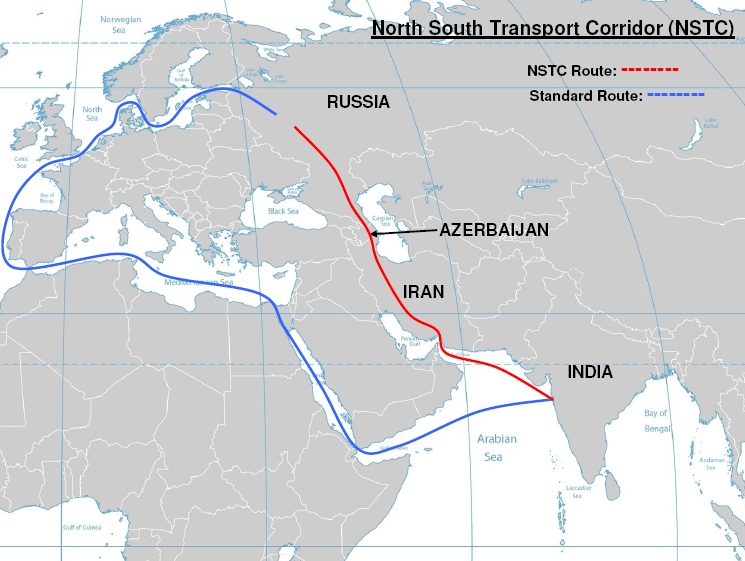At the end of March, Iranian President Hassan Roushani traveled to Azerbaijan to mark the opening of Iran-Azerbaijan segments of the International North-South Transport Corridor (NSTC). The NSTC, which has been lauded by Russian President Vladimir Putin as a “flagship project,” will be a nearly 4,500 mile long network, comprising rail, road and water routes with the goal of stimulating trade between Russia, Iran, Central Asia and India.

To this end, three railroad segments connecting the northwestern city of Qazvin to the border city of Astara are slated for construction inside Iran in the next three years. According to news site AzerNews.az, the the portion linking the city of Astara, Iran to its counterpart in Azerbaijan (also named Astara) was launched March 29. During the opening ceremony, Hossein Ashuri, on the board of directors of the national state-owned railway system of Iran, noted that an agreement for $500 million would be signed during the Iranian president’s visit to go towards further construction of the railway.
Alexander Karavaev, a researcher at Moscow State University’s Institute of Economics, said that the grain regions of the Russian Federation eagerly await the new railway, as it will counteract the 2016 ban Iran had introduced on Russian imports wheat in order to support its local farmers. Before the ban, Iran was the third largest buyer of Russian wheat after Egypt and Turkey.
The Minister of Agriculture of Russia’s Stavropol Territory, Vladimir Sitnikov, said that the opening of the Azerbaijani transport direction will increase the purchase price of the Stavropol grain by 10 to 15 percent and that the opening of these segments of the corridor will shorten the delivery time to grain for five to seven days, equalling a 30 percent reduction in transportation-related costs.
President Rouhani’s Baku trip was a reminder of intensifying good relations between the two countries in recent years. “It is important to recall that before Hassan Rouhani was elected, Baku-Tehran relations were rather tense,” says political scientist Rovshan Ibragimov, speaking with Vestnik Kavkazabut, “Iran’s foreign policy towards the northern neighbor radically changed under Rouhani and became constructive.”
To this end, a total of eight collaborative agreements were signed during the president’s visit, only one of which dealt expressly with the railway. The two nations have arranged for a number of cultural and social initiatives, as well, among which an “Executive Plan on Cooperation Between the Ministries of Youth and Sports Affairs” and a “Culture and Arts Exchange Program” to take place between 2018 and 2021 are included. The president also participated in an inaugural ceremony of a joint Azerbaijani-Iranian car manufacturing factory.
“We always stand by Azerbaijan,” Rouhani stated at one point, praising the collaborations between the two countries. “If Iran is safe, Azerbaijan will be safe too. Likewise, if there is development in Azerbaijan, there will be development in Iran as well.”


Iran’s Mullah regime, politically and economically has no other choice, but to submit Putin’s surveillance map!
There is no one to blame for any of this except the Armenian government and its timid policies against its enemy. Armenia is cut out of regional projects, and at the same time shot at by the same culprit and suffered 100 murdered soldiers with no consequences, while Serjh sits by and watches and makes excuses. Keep watching, I guess a miracle awaits your future – as a reward for playing “Mr nice guy”.
Armenia has once again shot itself in the foot. How many more regional projects will Armenia be left out off? A solution must be found to this quagmire, or more opportunities will be squandered. Is it really in the interest of Armenia to have hostile relations with Azerbaijan and as a result Turkey? The solution to end Armenia’s seclusion is not impossible to achieve. It might even be beneficial for Armenia.